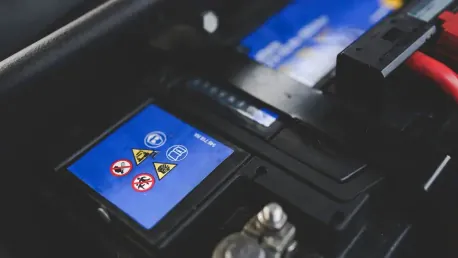The City of Phoenix has taken a significant step towards sustainability by endorsing repurposed lithium battery storage systems. This initiative marks a milestone in the second-life battery economy, aligning with the city’s sustainability goals and supporting the circular economy by extending the life of used batteries. The endorsement showcases Phoenix’s commitment to reducing environmental impact and promoting the use of environmentally friendly technologies. Given the rising demand for sustainable energy solutions, repurposing lithium batteries offers a practical and effective method to achieve these objectives, enabling Phoenix to create a greener and more efficient urban landscape.
Embracing Sustainability and Cost Savings
Repurposed batteries offer a sustainable solution by reducing emissions and waste associated with new battery production. These batteries are not only environmentally friendly but also more cost-effective, with an expected price reduction of 30-40% compared to new batteries. This cost efficiency makes them an attractive option for various energy storage applications. Lower costs not only benefit consumers but also public infrastructure projects, allowing for expanded usage of clean energy storage without prohibitive expense.
The environmental benefits of repurposed batteries are substantial. By avoiding the energy-intensive process of manufacturing new batteries, emissions are significantly reduced. Additionally, repurposing delays the need for recycling and prevents waste, contributing to a more sustainable lifecycle for lithium batteries. This extended lifecycle ensures that the resources and energy invested in the original production of these batteries are maximized, ultimately benefiting both the environment and the economy. Furthermore, the reduction in waste aids in minimizing the environmental footprint of lithium battery usage, aligning with the city’s overarching sustainability goals.
Building Trust and Ensuring Transparency
One of the main challenges in the second-life battery market is the lack of transparency and standards. Consumers need to trust that the repurposed batteries they purchase are reliable and safe. Currently, there is no mandatory digital battery passport to provide detailed information about the history and health of used batteries, which can make buyers hesitant. This uncertainty about the past performance and integrity of repurposed batteries remains a significant barrier to wide-scale adoption; therefore, establishing trust and verifiable credentials is critical for market growth.
The City of Phoenix has addressed this issue by officially approving a vendor for battery storage systems that use repurposed lithium batteries. This regulatory support helps establish credibility and trust in the second-life battery market, encouraging more consumers and businesses to consider repurposed batteries as a viable option. The approval by a respected governmental authority adds a layer of assurance, potentially easing consumer concerns and fostering a more robust market for repurposed lithium batteries.
Regulatory Support and Economic Viability
The endorsement by the City of Phoenix is a significant step towards building a robust second-life battery economy. Regulatory support not only helps in establishing trust but also paves the way for expanding battery repurposing into other city-wide electrification projects. This move aligns with the city’s broader sustainability goals and promotes the use of environmentally friendly technologies. By facilitating regulatory frameworks that support second-life batteries, Phoenix can help drive innovation and standardization across the industry, leading to increased investment and adoption of these sustainable solutions.
The economic opportunities within the second-life battery market are vast. Expertise in battery repurposing and recycling is crucial for the success of these initiatives. Companies like Bluewater Battery Logistics play a pivotal role by evaluating used batteries and determining their suitability for second-life applications. Their assessments ensure that repurposed batteries are safe and perform well in their new roles. Such technical expertise is essential for ensuring consistent quality and reliability in repurposed batteries, which in turn supports consumer confidence and market expansion.
Partnerships and Expertise in Battery Repurposing
Bluewater Battery Logistics specializes in navigating the nuanced requirements of battery performance and capabilities across varying chemistries, states of health, and capacities. Their expertise is essential for repurposing EV and other batteries for secondary applications, rather than merely recycling them. By effectively assessing and repurposing batteries, they help reduce waste and extend the useful life of these valuable energy storage units, contributing to broader sustainability efforts. The company’s ability to manage battery complexity and variability is a testament to the potential of second-life applications.
The process of repurposing involves rigorous testing of cells for voltage, capacity, and state of health. This ensures that the batteries are viable and safe for second-life applications. By providing these crucial services, companies like Bluewater Battery Logistics help maximize the value of used batteries and support the growth of the second-life battery market. Thorough testing and evaluation processes ensure the safety and effectiveness of repurposed batteries, thereby reinforcing consumer trust and supporting broader adoption of these sustainable energy solutions.
Addressing Economic and Material Considerations
For repurposed batteries to be economically viable, they must be at least 30-40% cheaper than new ones. This cost advantage is essential for attracting consumers and businesses to consider second-life batteries. Having an overseas partner with lower labor costs can also be beneficial in achieving this price reduction. The economic feasibility of second-life batteries is central to their market success, providing an affordable alternative to new batteries without compromising on performance or reliability.
The material value contained in lithium-ion batteries is another important consideration. For example, Lithium Iron Phosphate (LFP) batteries yield less valuable metals compared to Nickel Manganese Cobalt (NMC) batteries. This difference in material value underscores the importance of repurposing LFP cells to maximize their remaining value and avoid negative recycling costs. Efficiently managing these material considerations is crucial for optimizing the economic and environmental benefits of second-life battery applications.
Overcoming Challenges in the Second-Life Battery Market
A significant concern in the second-life battery market is the absence of transparency and standards. This lack of standardization requires new trust mechanisms and seller validation to ease the recycling and repurposing process. The approval of a vendor by the City of Phoenix exemplifies how trust can be cultivated, fostering a more streamlined and trustworthy second-life battery market. Establishing and adopting industry standards is vital for ensuring that repurposed batteries meet consistent safety and performance criteria, thereby supporting broader acceptance and utilization.
The City’s Sustainable Purchasing Policy promotes products and services with reduced environmental and health impacts. This policy aligns with the city’s 2050 Sustainability Goals and aims to meet the growing demands for resources like water and energy by procuring sustainable products. These initiatives contribute to a culture of sustainability and waste reduction, which are key performance indicators in the Circular Economy Projects. Such policies not only drive public sector adoption of sustainable practices but also inspire private sector innovation and investment in environmentally friendly technologies.
Successful Use Cases and Future Potential
The City of Phoenix has made a crucial move towards a more sustainable future by endorsing repurposed lithium battery storage systems. This forward-thinking initiative represents a significant milestone in the second-life battery economy, aligning seamlessly with the city’s ambitious sustainability goals. By supporting the circular economy and extending the lifespan of used batteries, Phoenix demonstrates its dedication to reducing environmental impact and championing the use of eco-friendly technologies.
As the demand for sustainable energy solutions continues to grow, repurposing lithium batteries presents a practical and effective approach to meet these needs. This strategy not only mitigates waste but also enhances energy efficiency and resilience. By adopting this progressive approach, Phoenix positions itself as a leader in the green energy movement, creating a more environmentally conscious and efficient urban landscape.
This endorsement by Phoenix underscores a broader commitment to sustainable practices and innovative solutions that benefit both the environment and the community. The integration of repurposed lithium battery storage systems is a strategic step that highlights the city’s proactive efforts to address pressing environmental challenges. Overall, Phoenix’s initiative is a testament to its leadership in sustainability and its vision for a greener, more efficient future.









